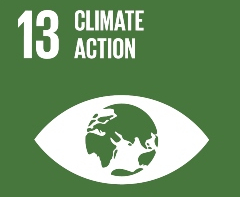
Empowering local organisations to help meet global climate change goals
In 2015, the Paris Agreement united nearly 200 countries in a global pact to tackle climate change.
To enable the UK to deliver significant carbon emissions reductions, The University of Manchester created the Tyndall Local Carbon Budget Tool, helping local authorities and organisations to play their part in achieving these global aims.
Key facts
- Used by 250 UK local authorities
- Led local policymakers to focus on immediate emissions reductions
- Shaped global policy as part of the United Nations’ Race to Zero initiative
This work delivers on the UN Sustainable Development Goal 13: take urgent action to combat climate change and its impacts.
As local authorities increasingly looked to understand how they could make a fair contribution to delivering on the global Paris Agreement, research led by Carly McLachlan, Director of Tyndall Manchester, and part of the national Tyndall Centre for Climate Change Research, created the Tyndall Local Carbon Budget Tool.
This free tool provides local authorities with a means to set annual emissions reduction rates, carbon budgets and a zero carbon target date.
Driving a shift in focus
The tool uses a scientifically robust methodology that enables local authorities to translate the Paris Agreement into sub-national carbon budgets.
250 of the UK’s local authorities, who are collectively responsible for 18% of the population, currently use the tool. By driving a critical shift in focus, these local authorities are now prioritising urgent and significant reduction in emissions to accelerate the pathway to net zero.
Researchers from Tyndall Manchester have worked on a local carbon budget tool that helps the UK’s regions navigate the complexities of interpreting global targets. This helps them understand the importance of immediate action to significantly reduce carbon emissions.
Carly McLachlan / Director of Tyndall Manchester
In Manchester, this work supported the city to commit to being carbon neutral by 2038, including commitment from major organisations such as Manchester City Football Club, who collectively represent 20% of the city’s emissions.
On a global level, this approach has been endorsed by the Carbon Disclosure Project who work with more than 650 cities worldwide. The tool is one of three accredited for use by cities participating in the United Nations ‘Race to Zero’ initiative.
Focusing on carbon budgets, not percentage reductions
This foundational research established the importance of embedding carbon budgets – rather than end point targets – in setting carbon reduction targets. Crucially, it highlighted that the pathway to zero carbon matters more than the particular date that we hit zero.
Manchester City Council and Greater Manchester Combined Authority policies have adopted Tyndall’s carbon framing, including: Greater Manchester Covid-19 Recovery Plan; Greater Manchester Investment Programme; and Greater Manchester Local Industrial Strategy.
The University of Manchester is now established as a leading authority on carbon budget setting.
Podcast: Empowering local organisations to help meet global climate change goals

Listen to The University of Manchester’s Dr Nic Gowland interview some of our leading experts about how their research is helping to deliver the UN Sustainable Development Goals for global health, equality and sustainability.
Download the Empowering local organisations to help meet global climate change goals podcast transcript (PDF, 472KB).
Supporting researchers
Connected activity
- Tyndall Carbon Budget Reports
- Decarbonising Manchester (blog)
- On Net Zero (PDF, 5.9MB)
Tyndall Carbon Budgets
Stream an introduction to local carbon budgets and how they can inform action on climate change.
Stream on YouTube
Tyndall Manchester
Find out more about Tyndall Manchester's research on energy and climate change.
Read more


